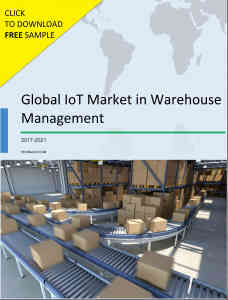Increased connectivity is everywhere, as technology companies manufacture everything from heating systems to refrigerators, and render them smart and internet-ready. In the same light, modern warehouses are far more than just a facility in which to store inventory. Leveraging Internet of Things (IoT) and the latest supply chain management technologies, a “smart warehouse” can now boost productivity, efficiency and speed throughout the supply chain.
From sensors to wearables and smart equipment, the internet-enabled technology and devices can positively impact the logistic management. Billions of IoT-enabled systems will be in circulation within the next few years, and the impression they will have on how companies control and distribute orders is likely to be substantial, say industry experts at Technavio.
How is IoT transforming warehouse management?
Internet of Things is intelligence personified. Connecting devices at your home or office seamlessly- IoT is also proficient at connecting devices that may not be classically associated with information technology. This creates a treasure trove of data and in the instance of inventory management, enables the creation of smart warehouses.
 A smarter, productive and accurate way to manage warehouses utilises the scalability and dependability as offered by the Internet of Things technology. With IoT, every item processed is tracked and recorded on inventory management systems throughout the supply chain procedure. Products can be easily located by ID numbers irrespective of where they are, and if they are inbounding as part of a shipment or are on their way to a customer’s doorstep.
A smarter, productive and accurate way to manage warehouses utilises the scalability and dependability as offered by the Internet of Things technology. With IoT, every item processed is tracked and recorded on inventory management systems throughout the supply chain procedure. Products can be easily located by ID numbers irrespective of where they are, and if they are inbounding as part of a shipment or are on their way to a customer’s doorstep.
The inner workings of an IoT inspired smart warehouse
Today, cloud-based inventory systems are the most used techniques in warehouses, allowing inventory management systems to give organizations better visibility into their own inventory levels, item location, forecast demand, expiration dates and more. The products usually have a barcode label or a RFID tag, so that they can be scanned and identified by the connected systems.
With the introduction of IoT in warehouse management, the ability to track and communicate with products will significantly increase. RFID tags will now hold more information about an object and will be proficient at communicating that information to an inventory system. RFID tags will be built into items, which can precisely send data about temperature, traffic, damage to the object, weather and much more.
IoT’s versatility is a key factor in effective warehouse management
Internet of Things is poised to rejuvenate the global delivery and logistics industry, relieving undue stresses that are building up due to non-strategic management, and impacting the companies, retailers and consumers alike. Additionally, IoT also has a progressive role to play in other related industrial verticals as well. Conclusively, IoT vendors are stepping into an era of tremendous opportunities, provided they are aware of and are reactive to the changing market dynamics.



